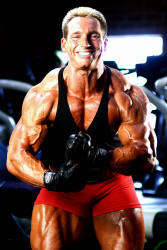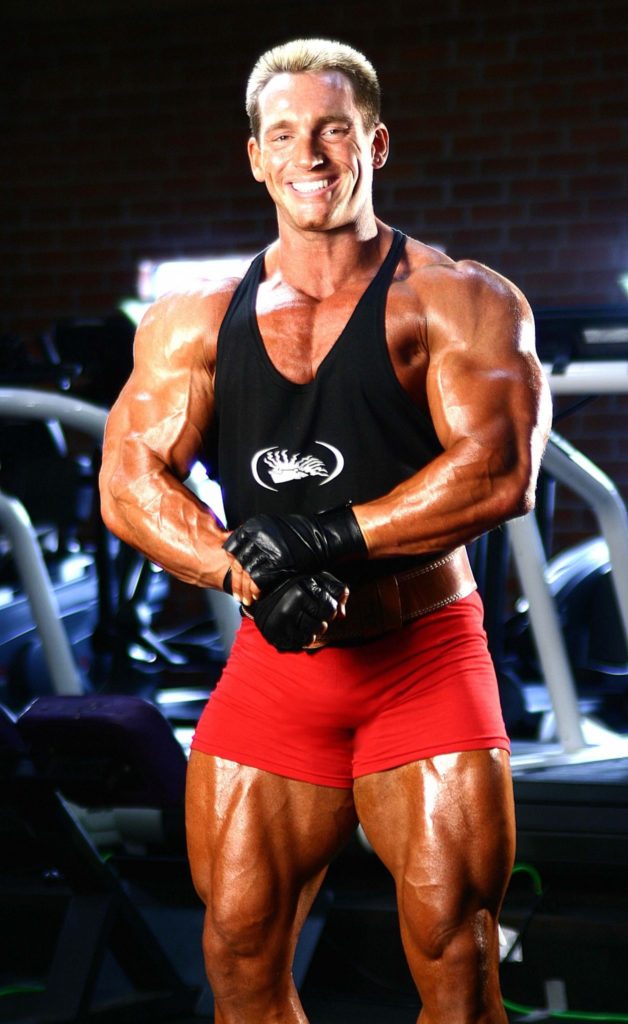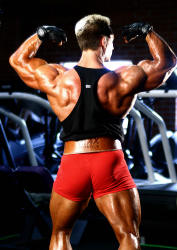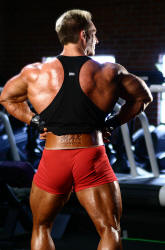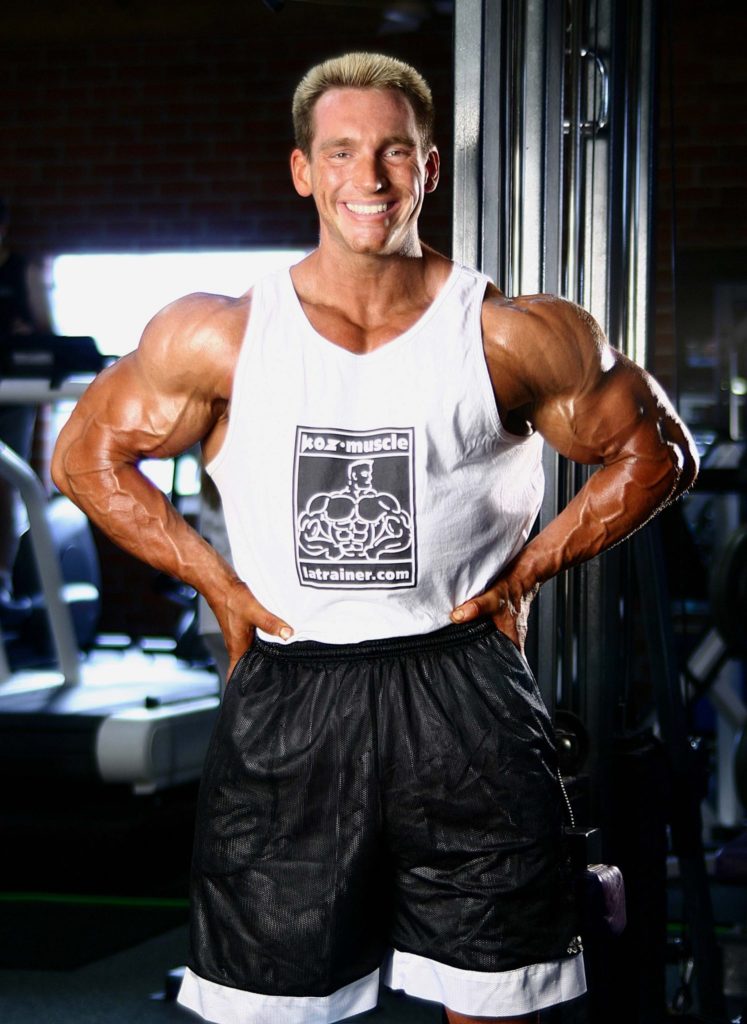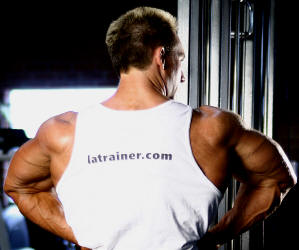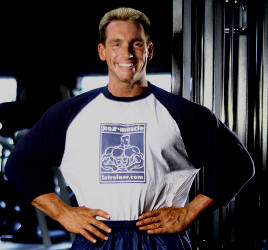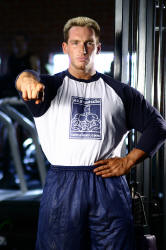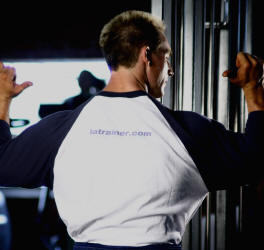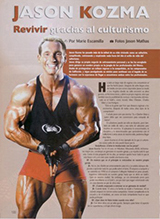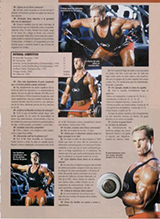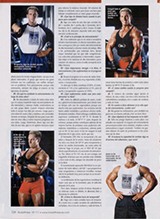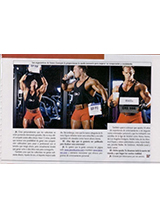Gym Gallery by Jason Mathas
BodyFitness – ES interview
Spanish Body Fitness muscle magazine interview
Note: this was written in Spanish and translated back to English so there are going to be some language issues. Also the photos taken with Jason Mathas were to be used in promotion of their supplement line so there will be mentions of their products. – JK
Jason Kozma has spent more than half of his life living as a bodybuilder, competing, training and breathing every hour of the bodybuilding lifestyle. Jason runs his own personal training business and has managed to earn a name in the jungle of fitness professionals.
He has just starred in a successful return to competition, in the California championships, and continues to pursue his mission to continue with his brother’s legacy with the hope of reaching both professionals. It’s been a long trip back to competition that Jason has done.
After eight long years of battle with a severe depression, Jason moved to Los Angeles where he not only found his soulmate, his beautiful girlfriend, and opened his own business, but also had the chance to meet the legends of bodybuilding at Gold’s Gym Venice, like Arnold, Mike Christian, Charles Glass and Lou Ferrigno. “These are the people who made me want to return to the stage, after all these years away from the competition.” And
Jason adds with a smile “It’s to Charles Glass that I owe it to convince me to compete again.” Bodybuilding can be just a sport, but also a way of life and a lifeline for many of us. If we apply the concentration, discipline and determination that we learn with bodybuilding to other areas of our life, we can go very far.
Jason Kozma is the living example of what lifestyle as a lifestyle can do for you.
Bodyfitness: How did you get involved with the weights? Jason Kozma: It was at my home in Milwaukee, Wisconsin, USA, my brother Joe, he built a gym in our basement and I repeated everything I saw. As the youngest of the two, I always wanted to do everything I saw him do, and in this case it turned out to be a good thing.
BF: So in the beginning you trained in your own garage.
JK: That’s right. Joe designed a training for me and I was always willing to learn everything I could on the subject. He started competing and became the 1990 Collegiate National champion in heavyweight. We continued training in our garage until a Gold’s Gym opened in our city. However, I was too young to enroll in Gold’s, so I had to keep training alone at home for a couple of years.
BF: When did you start training in a real gym?
JK: When I was 13 years old and the family moved to Tennessee, that’s when my career as a competitor began. I was competing in school and in the institute, as well as in any local competition in which I could participate.
BF: What kind of physique did you have when you were a child?
JK: When I was twelve, I was a fat kid. I always wanted to look like a superhero, or the one I now have.
BF: Who was your hero then?
JK: Arnold, how could it be otherwise! And also my brother, because he was the one who started me in this sport.
BF: Did you try other sports or did you just stay with bodybuilding? JK: I started with martial arts at the same time that I was premiering as a bodybuilding competitor, I was 13 years old. First it was judo, then Tae Kwon Do and then karate. I am a black belt of Wado-Ryu karate. Like all teenagers I tried most sports such as football, basketball, baseball and racquetball, but it was lifting weights and feeling strong that really hooked me.
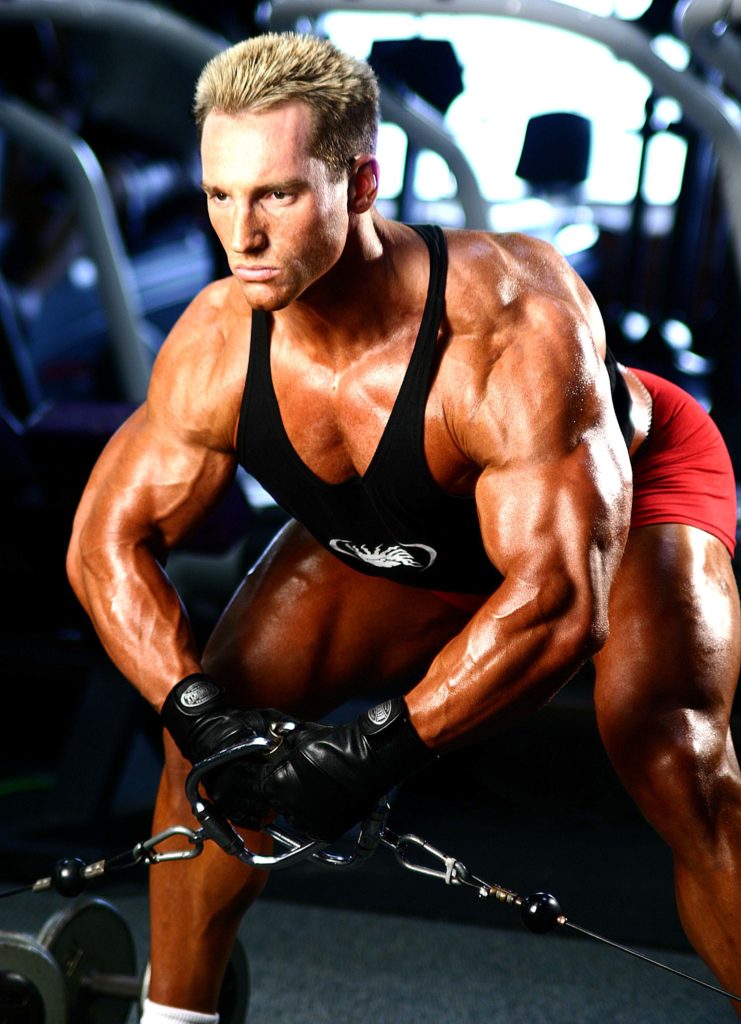
COMPETITIVE HISTORY Mr Knoxville Tennessee, 1989 Mr Tennessee, 1989 Kentucky Derby Bodybuilding Championships, 1990 Kentucky Derby Bodybuilding Championships, 1991 Southern States Championships, 1991 Orange County, 2003 Mr California
BE: Do you give more importance to the weight employed than to the strict form when you train?
JK: No, I’m just proud of being strong in all the exercises and not just in any of them. So not only did I use 200 kilos on the bench press and 700 kilos on the leg press, for several repetitions, but I have also done side elevations for the shoulders with 32-kilogram dumbbells, openings with those of 45 and curi with those of 38.
BF: What is your philosophy when it comes to training?
JK: Everything a man can do, another can equal it. That is how I have developed my almost superhuman strength. I used to read in the magazines the pesos that the professionals moved and I said to myself: ‘if they can, I can too’ and that’s what I did.
BF: How many times have you competed?
JK: Eight or nine, I think. I started as a teenager and I kept going up.
BF: Do you remember which was the first time?
JK: It was Mr Teen Knoxville, in Tennessee. I finished third and was 16 years old at that time. I repeated the same classification (place and class) a week later at the NPC Mr. Tennessee in Nashville against much more difficult competitors. It was the year 1989.
BF: In total, how many years have you been training?
JK: More than half of my life, 19 years.
BF: Would you say that bodybuilding still occupies a leading place in your life?
JK: Ele lived the bodybuilding lifestyle 100% since I was 16 years old. I have become a personal trainer thanks to my love for training and I think I am a good professional thanks to my long experience in bodybuilding. So I think it can be perfectly said that bodybuilding is the central point of my life.
BF: What objective do you have now in your training?
JK: In this year my goal is to gain more quality size to be able to compete next year in the super heavyweight category, or at least the heavyweight limit. I hope to participate in the California Championship, the Junior Nationals and the USA of the NPC. Right now I train with Charles Glass and Mike O’Hearn is a training partner. Everyone is helping me and pushing me this year.
BF: How do you train right now?
JK: In pre-competition I train six or seven days a week. The seventh day is dedicated only to cardio.
BF: Give me the details in terms of series and repetitions.
JK: I usually do four to six exercises per group, rather four to six. From each one I do four sets of between four and ten repetitions for the groups of the upper body and between 10 and 20 repetitions for the abdominals, femorals and twins.
BF: For example, detail your back routine.
JK: For the back I usually do the following: • Dumbbell rowing, 4 sets of 10, 10, 8, 5 • Pull ups, 4 sets of 25, 15, 10, 10 • Rowing in Hammer machine, 4 sets of 10 • Pulls in pulley with straight arms, 4 sets of 10 • Shrugs, 4 sets of 10.15 • Deadlift, 4 sets of 10 Although deadlifts and shrugs are not direct dorsal exercises, I like to include them in the back session.
BF: What is your favorite group when it comes to training?
JK: Definitely the shoulders, because they are incredibly strong and I like the look they get when I train them.
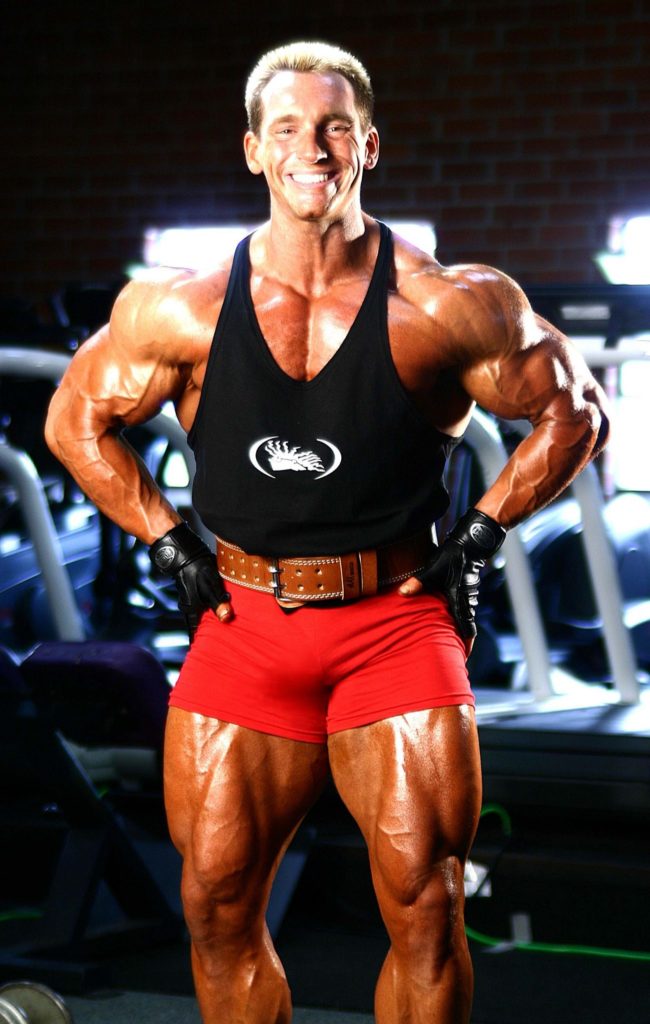
Serious training with high loads always bears fruit.
~ If you want something really, you can get it, just spare no effort.
Now I’ve never had any injuries, so it’s a pleasure to be trained. The group that I like least to train are the quadriceps. Knees are always a problem. But precisely because I hate trained, I always force myself to the maximum in leg exercises.
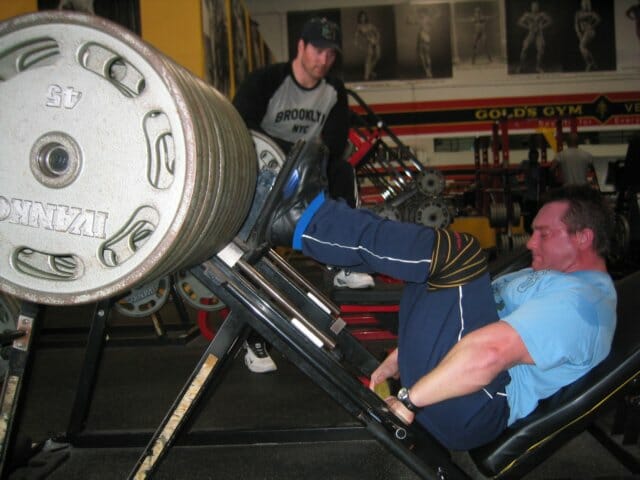
BF: How has your training changed over these years?
JK: I have discovered through all these years that my body responds better to high intensity and medium volume training, focusing on a single daily group. When I started training the whole body three days a week. Then I went through a four-day routine and pounded six weeks for a while. After that I went to a five-day division and made more progress with that routine. Then, finally, I am now following a six-day divi- sion, which in my opinion works best
The TH 101 provides you with the help you need for those btiutal sessions.
to obtain muscle maturity. My workload is enough to last one hour to fully work a single muscle group. BF: What kind of division do you make when you prepare to compete?
JK: I follow a six-day routine consisting of: day 1- back, day 2- chest, day 3- femoral, day 4-shoulders, day S- quadriceps and day 6- arms. The seventh day is total muscle rest but I do cardiovascular exercise.
BF: What is your training principle?
JK: I really believe that at my level the true impressive size and muscular toughness, can be achieved only by means of high-intensity training and average work volume. Look at the professionals who train hard, have higher density than those who only congest. Beginner and intermediate bodybuilders respond better to high-intensity, low-volume training systems, such as Mike Mentzer’s style.
BF: What importance do you give to diet, training and supplements in total progress?
JK: Well progress is the sum of several factors, and you have forgotten one very important one: restlessness or recovery. I would say that diet constitutes 80%, training 15% and supplements 5%, but sleep and recovery are 100%.
BF: What supplements do you usually use to supplement your diet?
MT: I used to use protein from whey, creatine and glutamine before, but for a while now I only use ergoceutics because they are much more than supplements. Its actions are of strong metabolic importance and produce truly remarkable effects. Now I get much better results combining the WP R 10 during the morning or the afternoon, the WP P 11 just after training, because both constitute in addition to the best sources of proteins a powerful metabolic and endocrine stimulants, also together with the AB 18 twice a day I assure myself of the total absorption of what I eat, whatever it may be. The CRS 086 hydrator is great and I use it before and after the session. Before going to bed I serve a dose of GP 01 to recover and raise hormone levels, as well as before training do the same with the TEST RF 05 that specifically affects the secretion of testosterone. Finally the TH 101 gives me an almost inexhaustible energy while allowing me to be defined and hard all year round, although I neglect a bit in the diet. The recently appeared VM-N0x2 is a pre-cursor of nitric oxide and IGF 1 that provides incredible congestions and resistance, although I have only tried it very little because it is not easily found. The combination of ergoceutics is the best thing that has been invented for the bodybuilder after the weight. Of course, they do not have the desired effect if you do not train properly, you eat well and you get enough rest.
BF: How do you feed yourself out of season?
JK: I do six or seven meals out of season and I take three or four services of complex carbohydrates, two or three of vegetables and no fruit.
124 – Bodyfitness – No. 111 • www.bodyfitness-es.com
Carry all the, 11 weight that you can without sacrificing the form.
Sometimes I take protein bars and especially several shakes of WP R 10 during the day.
BF: And how does it change when you prepare to compete?
JK: The number of meals is the same, from six to seven, with two or three services of complex carbohydrates, three or four of vegetables and no fruit.
BF: As for other hobbies in your life apart from training, what are they?
JK: I like computers, but I also like to watch a good movie and read a good book.
BF: What goals have you imposed on yourself in life?
JK: I only set short-term goals. The current ones are to expand my personal training business to include other cities, hire other coaches and keep growing. I also like to get my professional license in the next couple of years.
BF: If you had the ability to change something in the field of bodybuilding, what would it be?
Jason has become the coach of celebrities
The ergoceutics of Future Concepts provide the necessary help to improve your recovery and growth.
JK: I personally believe that bodybuilders are getting too big. It is very difficult for me to compete against them now. 12 years ago, I might have a chance to win an IFBB pro qualifying competition to become a professional bodybuilder with the size I have now, but now I will have to gain eight or ten kilos to get it. I also believe that bodybuilders do not earn enough money. Apart from that, sport improves everyday. However, I think that the new categories of fitness and bikini and figure should have a free posing round and not just stand there as they do right now.
BF: Is there something you would like to see published to end this interview?
JK: Yes, I want people to know my websites: jasonkozma.com and also www.smpersonaltraining.com and also mention that I offer online personal training programs.
I also want to emphasize that I bring 18 years of training experience to my business as a personal trainer and that I have worked with baseball league stars such as Hideo Nomo of the Los Angeles Dodgers, Hideki Irabu of the Montreal Expos and other celebrities such as Adam Baldwin, Jennifer Rubin, Bo Goldman, Michelle Lintel and Holly Lamar.
BF: That said. We give you all the luck in the world and make your dreams come true.
JK: Thanks for your interest in my career!


